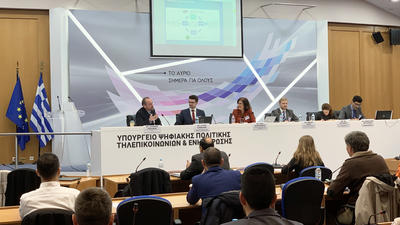-
Our work
-
Fields of work
- Arms control
- Border management
- Combating trafficking in human beings
- Conflict prevention and resolution
- Countering terrorism
- Cyber/ICT Security
- Democratization
- Economic activities
- Education
- Elections
- Environmental activities
- Gender equality
- Good governance
- Human rights
- Media freedom and development
- Migration
- National minority issues
- Policing
- Reform and co-operation in the security sector
- Roma and Sinti
- Rule of law
- Tolerance and non-discrimination
- Youth
- Field operations
- Projects
-
Meetings and conferences
- Summit meetings
- Review Conferences
- Ministerial Council meetings
- Plenary meetings of the Permanent Council
- Plenary Meetings of the Forum for Security Co-operation
- Security Review Conferences
- Annual Implementation Assessment Meetings
- Economic and Environmental Forum
- Economic and Environmental Dimension Implementation Meetings
- Human rights meetings
- Media conferences
- Cyber/ICT security conferences
- Conference of the Alliance against Trafficking in Persons
- Gender equality conferences
- Annual OSCE Mediterranean conferences
- Annual OSCE Asian conferences
- Partnerships
-
Fields of work
-
Countries
- All
-
Participating States
- Albania
- Andorra
- Armenia
- Austria
- Azerbaijan
- Belgium
- Belarus
- Bosnia and Herzegovina
- Bulgaria
- Canada
- Croatia
- Cyprus
- Czechia
- Denmark
- Estonia
- Finland
- France
- Georgia
- Germany
- Greece
- Holy See
- Hungary
- Iceland
- Ireland
- Italy
- Kazakhstan
- Kyrgyzstan
- Latvia
- Liechtenstein
- Lithuania
- Luxembourg
- Malta
- Moldova
- Monaco
- Mongolia
- Montenegro
- The Netherlands
- North Macedonia
- Norway
- Poland
- Portugal
- Romania
- Russian Federation
- San Marino
- Serbia
- Slovakia
- Slovenia
- Spain
- Sweden
- Switzerland – OSCE Chairpersonship 2026
- Tajikistan
- Türkiye
- Turkmenistan
- Ukraine
- United Kingdom
- United States of America
- Uzbekistan
- Asian Partners for Co-operation
- Mediterranean Partners for Co-operation
-
Structures and institutions
- Chairpersonship
-
Secretariat
- Secretary General
- Office of the Secretary General
- Conflict Prevention Centre
- Transnational Threats Department
- Office of the Special Representative and Co-ordinator for Combating Trafficking in Human Beings
- Office of the Co-ordinator of OSCE Economic and Environmental Activities
- Gender Issues Programme
- Opportunities for Youth
- Department of Human Resources
- Department of Management and Finance
- Office of Internal Oversight
- Documentation Centre in Prague
- Institutions
-
Field operations
- Presence in Albania
- Centre in Ashgabat
- Programme Office in Astana
- Programme Office in Bishkek
- Mission to Bosnia and Herzegovina
- Programme Office in Dushanbe
- Mission in Kosovo
- Mission to Moldova
- Mission to Montenegro
- Mission to Serbia
- Mission to Skopje
- Project Co-ordinator in Uzbekistan
- Closed field activities
- Parliamentary Assembly
- Court of Conciliation and Arbitration
- Organizational structure
- About us
News Item
OSCE Transnational Threats Department co-organizes training course in Athens on enhancing cyber stability and co-operation in the Mediterranean region
Forty policymakers, technical officers and private sector representatives from ten OSCE participating States and Mediterranean Partners for Co-operation completed a two-day sub-regional training course in Athens on how international cyber/ICT security mechanisms can enhance regional cyber stability...

- Issued on:
- Issued by:
- OSCE Secretariat
- Fields of work:
- Cyber/ICT Security
Forty policymakers, technical officers and private sector representatives from ten OSCE participating States and Mediterranean Partners for Co-operation completed a two-day sub-regional training course in Athens on how international cyber/ICT security mechanisms can enhance regional cyber stability.
The training course held on 7 and 8 February 2019, was organized by the OSCE Transnational Threats Department, in co-operation with the National Cyber Security Authority of Greece’s Ministry of Digital Policy, Telecommunications & Media.
The participants learnt about regional and global efforts to reduce the risk of conflict stemming from the use of ICTs, in particular, the Confidence-Building Measures (CBMs) that have been developed by OSCE participating States. There was also a focus on encouraging representatives of OSCE participating States and the Mediterranean Partner States to build or strengthen ties with each other on confronting cyber/ICT security issues and exploring how these ties can be formalized through the OSCE as a platform.
On the first day, the training course featured multiple experts and discussion panels on the prevailing threats stemming from cyberspace in the region, the mechanisms that can be deployed to address them and how the Mediterranean Partners can be engaged in future OSCE cyber/ICT security efforts. The participants were joined by experts from Microsoft and the UN Office for Disarmament Affairs (UNODA).
On the second day, participants visited the premises of the EU Agency for Network and Information Security (ENISA) and took part in an OSCE-led scenario-based discussion. Through four stages of an escalating fictitious cyber/ICT incident, participants were asked to flesh out their national perspectives, mitigation and national co-ordination policies, give their views on international co-operation with affected and/or suspected states, and clarify what roles the OSCE, as a platform and guardian of the CBM process, can play.